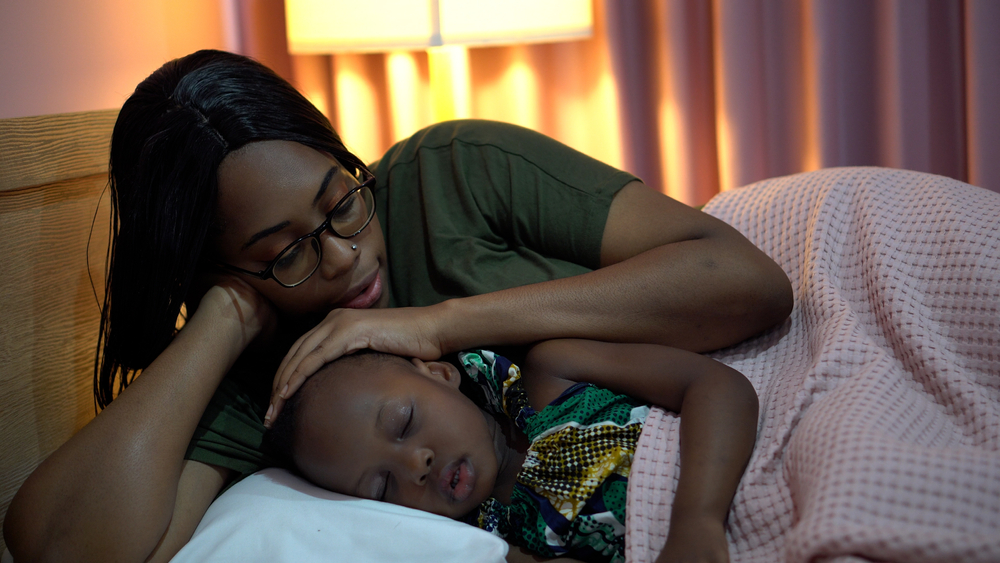How to Help a Child Who’s a Troubled Sleeper
Nov. 17, 2021
Are your child’s sleeping problems creating havoc in your home? Does your child’s caregiver or teacher inform you that they have trouble concentrating at school or seem to always be tripping over their own feet? Have you noticed that they tend to doze off on the way home, or cranky or irritable with family members? Many of these symptoms can indicate that your child isn’t receiving enough sleep according to their age. Children ages one to three need 12-14 hours of sleep per day (including naps), ages three to five need 10-13 hours per day, and ages six to twelve need 9-12 hours.
A child may become a troubled sleeper when they are experiencing difficulties with:
Bedtime Fears and Anxiety
Fear or worry before bedtime is one of the primary causes of insomnia in children. A child may dislike the dark or being alone, or one with a vivid imagination could hear noises late at night and dread monsters approaching when it’s simply a squeaky laundry dryer. Fears normally lessen with age, but until they do, make their sleeping area relaxing and safe. View the room from their bed and try to add personal touches, such as family photos or other cheerful images to promote inner tranquility.
Nightmares
Fear of having a terrible dream makes it difficult to fall asleep. If dreams keep your child awake, encourage them to talk to you or illustrate what they experienced or felt, which can sometimes help curb the frequency of nightmares. Monitor the movies or books your child has been consuming which, if disturbing or violent, can create negative thinking before bedtime. Consider establishing a bedtime routine that promotes positive thoughts, such as imagining a favorite place or activity, or close family members.

Testing Limits
Refusing to go to bed is a common condition for toddlers and kids of elementary age. It is up to you to decide when your child goes to bed, even if they appear alert and energized. Setting behavioral boundaries and being firm about bedtime is essential. Around the age of two, many children test the limits set by their guardians.
Creative requests such as a need for a tissue, another glass of water, or the desire to “tell you something important” can establish themselves regularly before bedtime. If you stick to the boundaries you’ve set and refuse to give in to trivial demands, the demands will eventually go away. For older children, creating a chart with gold stars and awarding a star for every night they remain in bed might be a good technique. You can find helpful tips on managing nighttime agitation by checking out our article here.
Big Life Changes
A substantial life or habit change might affect the sleeping patterns of a child with no previous sleep problems. Divorce, death, sickness, or relocating to a new place can easily trigger sleep issues. It helps to feel protected at difficult times, so using a favorite blanket or stuffed animal can help with feeling safe. Exercise and practicing mediation or mindfulness can help boost those “feel-good” hormones and allow the mind to process stressful situations. Our article on healthy coping skills and calming strategies will lead you in the right direction.
Worry and Stress
Sleep doesn’t come easily when you're nervous about difficult life issues. After-school activities, important dates, sports, and housework can all cause stress. Encourage your child to talk with you if they’re feeling overwhelmed. Establish a “worry time” (scheduled during the day) that allows you and your child to discuss what may be bothering them to prevent nighttime pondering. Consider balancing your child’s academic, social, and extra-curricular schedule, which may include giving up certain hobbies to gain extra family time focused on decompression for reducing stress.
Uncomfortable Environment
It can be difficult to sleep if you're too hot, chilly, hungry, or crowded. Create a sleep-friendly nighttime environment by making sure your child’s bed is suitable for sleep and relaxation – not crammed with too many toys and plush animals. Pay attention to room temperature, brightness, and extra noise. Some relaxing ways to prevent insomnia are a warm bath, listening to calm music, or reading a book.

Follow these healthy sleeping tips to ensure your little night owl is set up for success in the bedroom:
- Adhere to a nightly bedtime routine. Following a consistent schedule will help their biological clock to pump out those sleep-boosting hormones when they need them. Maintaining consistency is key.
- Establish a screen curfew. It’s well documented that screens can affect the development of natural sleep hormones when it’s time to get ready for bed. Initiate a time to turn off screens at least two hours before bedtime to give their brain time to adjust. Be mindful of limiting scary content as well. If your child is asking to do an activity before bed, keep it screen-free by letting them color some of our fun and free coloring printables.
- Avoid caffeine or stimulants a few hours before bedtime. Limit chocolate or sugary desserts at night.
- Prevent overstimulation by properly regulating temperature, light, and noise levels in sleeping areas. Look into calming essential oils for sleep aromatherapy.
- Engage in some bonding one-on-one time with your child before bedtime. Singing songs or reading a favorite bedtime story will get your kids excited for getting ready for bed because they know they will get a special moment with you. Kids Academy has some great songs for you to sing together before bed: Twinkle Twinkle Little Star and Ten in the Bed are our favorites!
As a parent, you may want to approach your child's physician for guidance or assistance with sleep disorders if they are struggling with insomnia AND one of the following: snoring or irregular breathing during sleeping, daytime sleepiness, a suspected mental or developmental issue, or if you consider using sleeping supplements. Your pediatrician may also be able to provide you with further resources or information. Keep a daily log of your child’s nap and sleeping activity for a few weeks before your visit, which can help discover trends and potential issues.
Sleep issues in children can lead to reckless behavior, impulsivity, and moodiness. It’s important to remember these problems are not the result of poor parenting, nor are they necessarily psychological conditions. Follow our tips for healthy snoozing and we hope your youngster will start to catch up on their precious beauty sleep! Find more helpful information at our parenting blog.
About the author
United States, CA, Felton
Links and references
- https://www.sleepassociation.org/children-and-sleep/basics-of-sleep-problems-in-children/
- https://www.webmd.com/sleep-disorders/children-sleep-problems
- https://www.sleepfoundation.org/children-and-sleep/sleep-strategies-kids
- https://kidshealth.org/en/kids/cant-sleep.html
- https://www.helpguide.org/articles/sleep/childhood-insomnia-and-sleep-problems.htm




.jpg)







